International Labor Organization: Role and Effectiveness
VerifiedAdded on 2022/09/14
|7
|1621
|14
Essay
AI Summary
This essay delves into the International Labor Organization (ILO), examining its foundational role in promoting social justice and setting international labor standards. The essay explores the ILO's historical context, mission, and objectives, highlighting its focus on creating decent work, promoting labor rights, and fostering social dialogue. It critically assesses the ILO's effectiveness, considering its strengths such as its commitment to worker development and its framework for stable globalization, and its weaknesses, including the lack of enforcement power in the global economy. The essay also discusses the ILO's impact on employment relations in a specific country, analyzing its contributions and limitations in that context. Furthermore, it touches upon the ILO's role in minimizing poverty through the establishment of legal frameworks and promoting fair labor practices. The analysis includes both pros and cons of the ILO and concludes by summarizing the organization's significance in the global landscape.
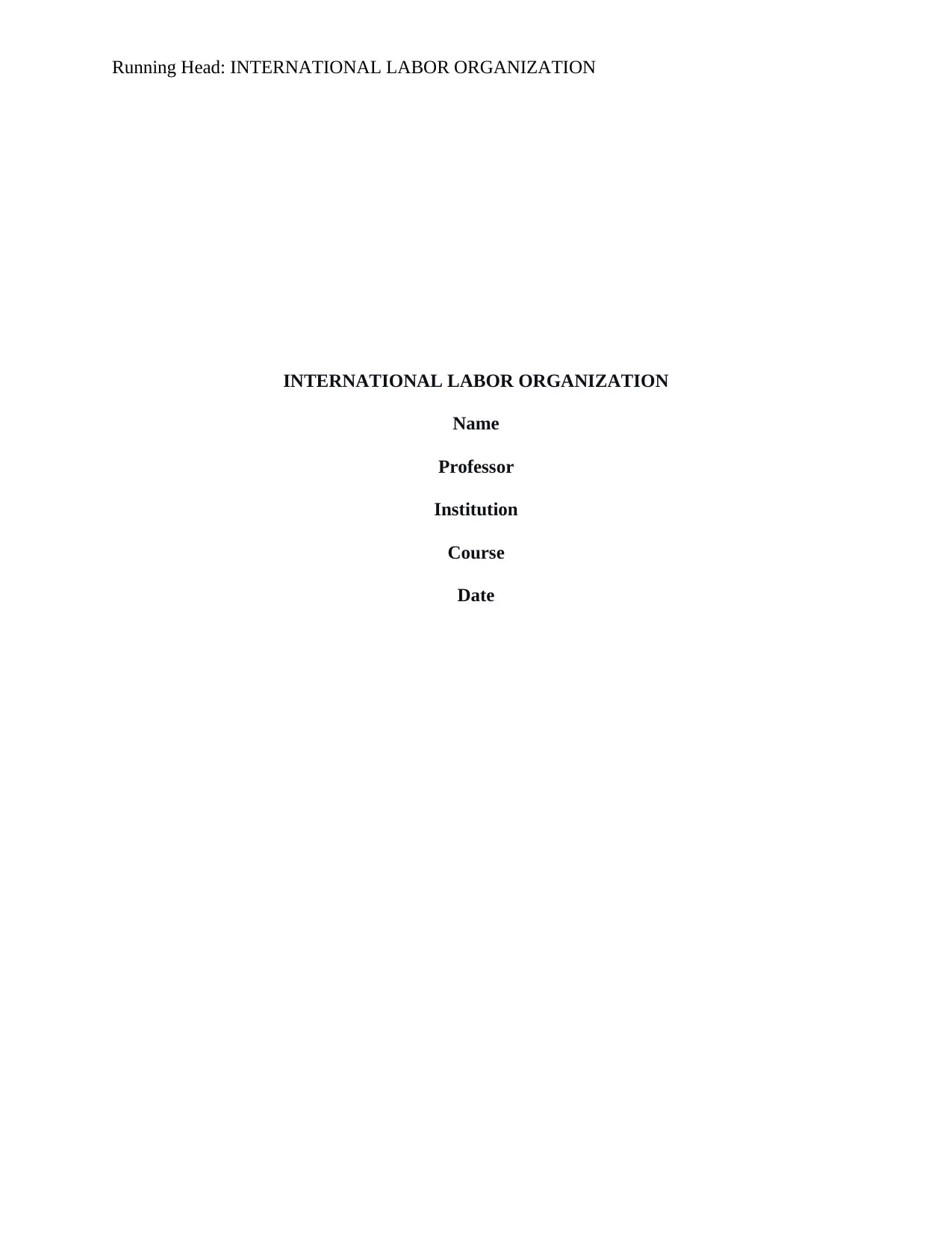
Running Head: INTERNATIONAL LABOR ORGANIZATION
INTERNATIONAL LABOR ORGANIZATION
Name
Professor
Institution
Course
Date
INTERNATIONAL LABOR ORGANIZATION
Name
Professor
Institution
Course
Date
Paraphrase This Document
Need a fresh take? Get an instant paraphrase of this document with our AI Paraphraser
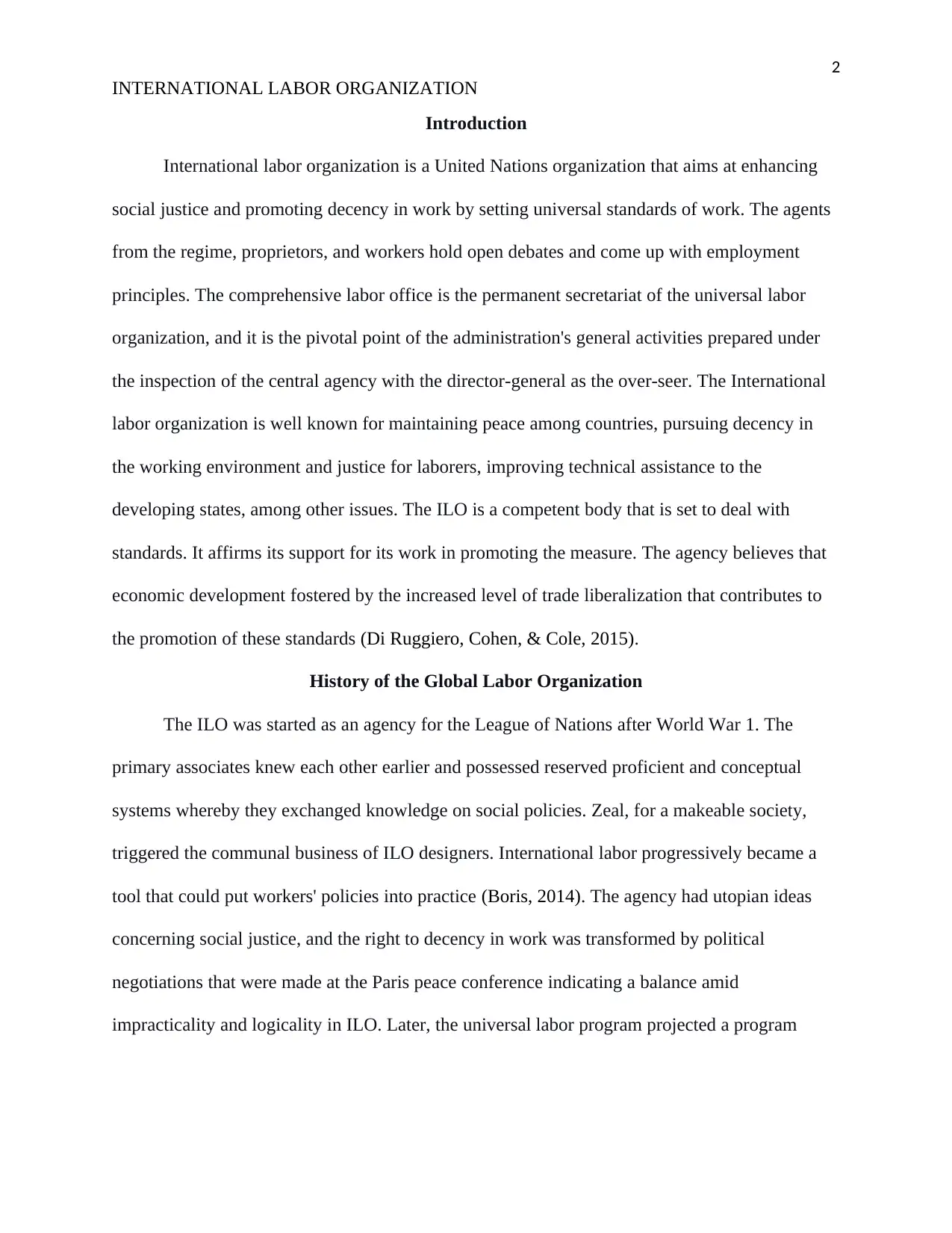
2
INTERNATIONAL LABOR ORGANIZATION
Introduction
International labor organization is a United Nations organization that aims at enhancing
social justice and promoting decency in work by setting universal standards of work. The agents
from the regime, proprietors, and workers hold open debates and come up with employment
principles. The comprehensive labor office is the permanent secretariat of the universal labor
organization, and it is the pivotal point of the administration's general activities prepared under
the inspection of the central agency with the director-general as the over-seer. The International
labor organization is well known for maintaining peace among countries, pursuing decency in
the working environment and justice for laborers, improving technical assistance to the
developing states, among other issues. The ILO is a competent body that is set to deal with
standards. It affirms its support for its work in promoting the measure. The agency believes that
economic development fostered by the increased level of trade liberalization that contributes to
the promotion of these standards (Di Ruggiero, Cohen, & Cole, 2015).
History of the Global Labor Organization
The ILO was started as an agency for the League of Nations after World War 1. The
primary associates knew each other earlier and possessed reserved proficient and conceptual
systems whereby they exchanged knowledge on social policies. Zeal, for a makeable society,
triggered the communal business of ILO designers. International labor progressively became a
tool that could put workers' policies into practice (Boris, 2014). The agency had utopian ideas
concerning social justice, and the right to decency in work was transformed by political
negotiations that were made at the Paris peace conference indicating a balance amid
impracticality and logicality in ILO. Later, the universal labor program projected a program
INTERNATIONAL LABOR ORGANIZATION
Introduction
International labor organization is a United Nations organization that aims at enhancing
social justice and promoting decency in work by setting universal standards of work. The agents
from the regime, proprietors, and workers hold open debates and come up with employment
principles. The comprehensive labor office is the permanent secretariat of the universal labor
organization, and it is the pivotal point of the administration's general activities prepared under
the inspection of the central agency with the director-general as the over-seer. The International
labor organization is well known for maintaining peace among countries, pursuing decency in
the working environment and justice for laborers, improving technical assistance to the
developing states, among other issues. The ILO is a competent body that is set to deal with
standards. It affirms its support for its work in promoting the measure. The agency believes that
economic development fostered by the increased level of trade liberalization that contributes to
the promotion of these standards (Di Ruggiero, Cohen, & Cole, 2015).
History of the Global Labor Organization
The ILO was started as an agency for the League of Nations after World War 1. The
primary associates knew each other earlier and possessed reserved proficient and conceptual
systems whereby they exchanged knowledge on social policies. Zeal, for a makeable society,
triggered the communal business of ILO designers. International labor progressively became a
tool that could put workers' policies into practice (Boris, 2014). The agency had utopian ideas
concerning social justice, and the right to decency in work was transformed by political
negotiations that were made at the Paris peace conference indicating a balance amid
impracticality and logicality in ILO. Later, the universal labor program projected a program
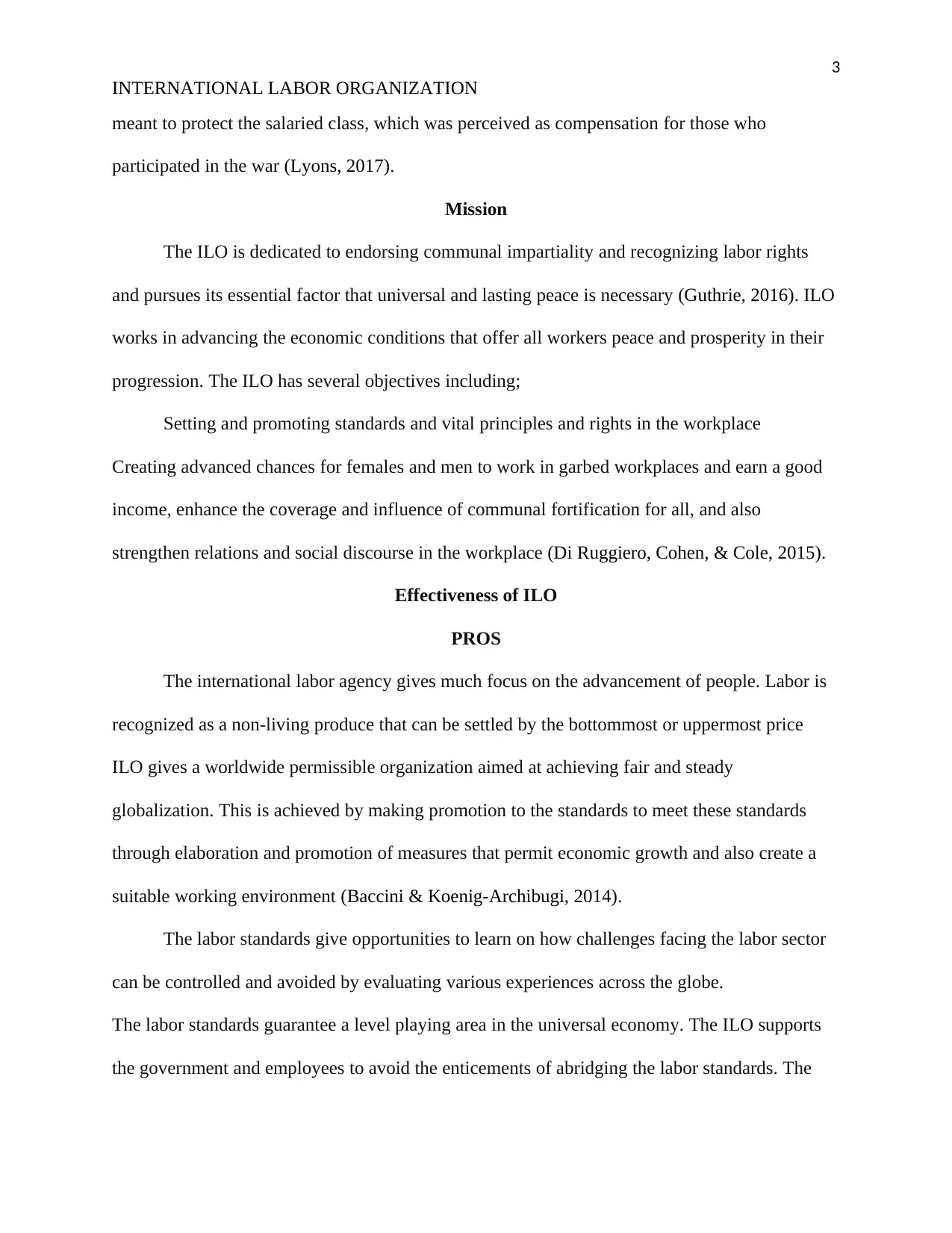
3
INTERNATIONAL LABOR ORGANIZATION
meant to protect the salaried class, which was perceived as compensation for those who
participated in the war (Lyons, 2017).
Mission
The ILO is dedicated to endorsing communal impartiality and recognizing labor rights
and pursues its essential factor that universal and lasting peace is necessary (Guthrie, 2016). ILO
works in advancing the economic conditions that offer all workers peace and prosperity in their
progression. The ILO has several objectives including;
Setting and promoting standards and vital principles and rights in the workplace
Creating advanced chances for females and men to work in garbed workplaces and earn a good
income, enhance the coverage and influence of communal fortification for all, and also
strengthen relations and social discourse in the workplace (Di Ruggiero, Cohen, & Cole, 2015).
Effectiveness of ILO
PROS
The international labor agency gives much focus on the advancement of people. Labor is
recognized as a non-living produce that can be settled by the bottommost or uppermost price
ILO gives a worldwide permissible organization aimed at achieving fair and steady
globalization. This is achieved by making promotion to the standards to meet these standards
through elaboration and promotion of measures that permit economic growth and also create a
suitable working environment (Baccini & Koenig-Archibugi, 2014).
The labor standards give opportunities to learn on how challenges facing the labor sector
can be controlled and avoided by evaluating various experiences across the globe.
The labor standards guarantee a level playing area in the universal economy. The ILO supports
the government and employees to avoid the enticements of abridging the labor standards. The
INTERNATIONAL LABOR ORGANIZATION
meant to protect the salaried class, which was perceived as compensation for those who
participated in the war (Lyons, 2017).
Mission
The ILO is dedicated to endorsing communal impartiality and recognizing labor rights
and pursues its essential factor that universal and lasting peace is necessary (Guthrie, 2016). ILO
works in advancing the economic conditions that offer all workers peace and prosperity in their
progression. The ILO has several objectives including;
Setting and promoting standards and vital principles and rights in the workplace
Creating advanced chances for females and men to work in garbed workplaces and earn a good
income, enhance the coverage and influence of communal fortification for all, and also
strengthen relations and social discourse in the workplace (Di Ruggiero, Cohen, & Cole, 2015).
Effectiveness of ILO
PROS
The international labor agency gives much focus on the advancement of people. Labor is
recognized as a non-living produce that can be settled by the bottommost or uppermost price
ILO gives a worldwide permissible organization aimed at achieving fair and steady
globalization. This is achieved by making promotion to the standards to meet these standards
through elaboration and promotion of measures that permit economic growth and also create a
suitable working environment (Baccini & Koenig-Archibugi, 2014).
The labor standards give opportunities to learn on how challenges facing the labor sector
can be controlled and avoided by evaluating various experiences across the globe.
The labor standards guarantee a level playing area in the universal economy. The ILO supports
the government and employees to avoid the enticements of abridging the labor standards. The
⊘ This is a preview!⊘
Do you want full access?
Subscribe today to unlock all pages.

Trusted by 1+ million students worldwide
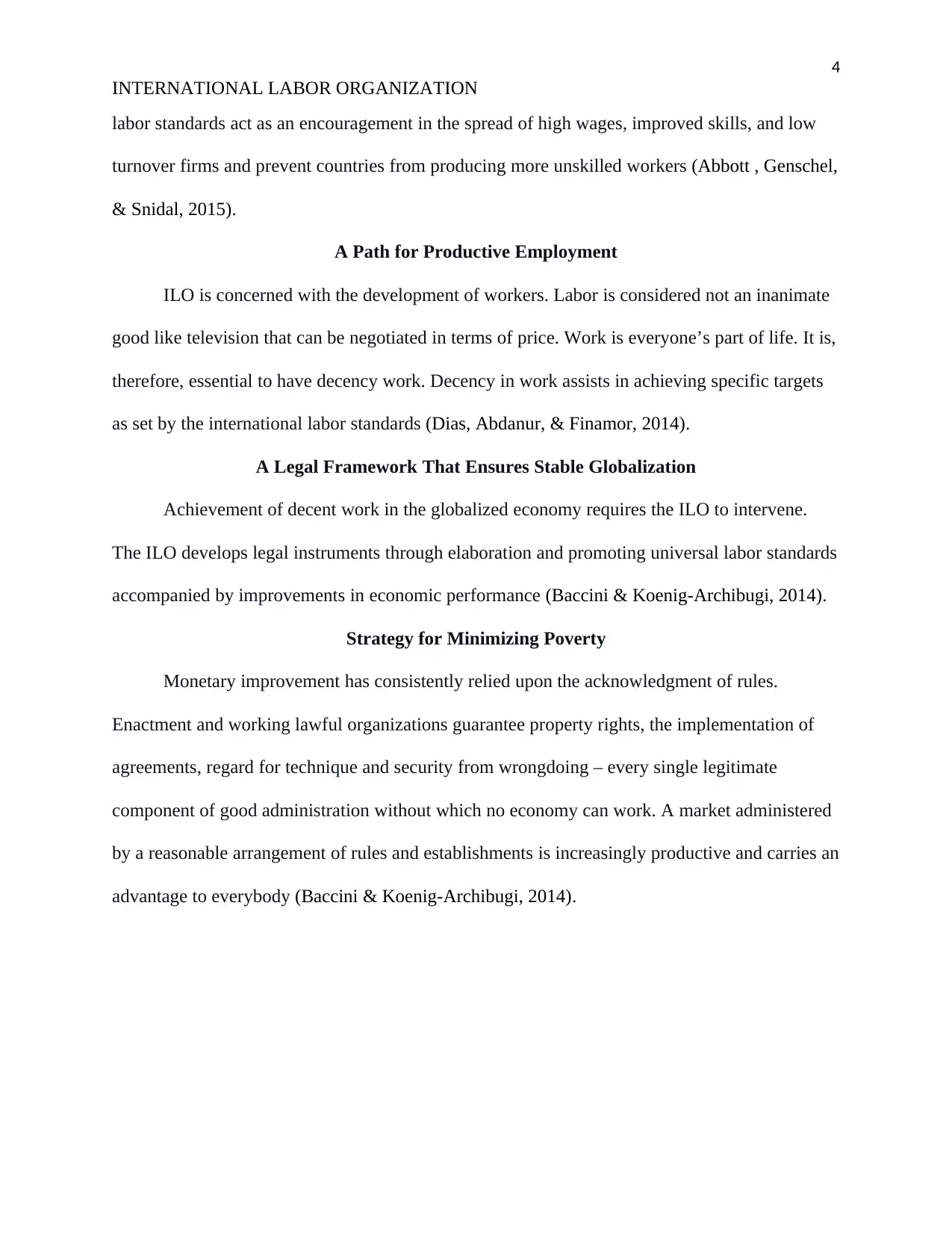
4
INTERNATIONAL LABOR ORGANIZATION
labor standards act as an encouragement in the spread of high wages, improved skills, and low
turnover firms and prevent countries from producing more unskilled workers (Abbott , Genschel,
& Snidal, 2015).
A Path for Productive Employment
ILO is concerned with the development of workers. Labor is considered not an inanimate
good like television that can be negotiated in terms of price. Work is everyone’s part of life. It is,
therefore, essential to have decency work. Decency in work assists in achieving specific targets
as set by the international labor standards (Dias, Abdanur, & Finamor, 2014).
A Legal Framework That Ensures Stable Globalization
Achievement of decent work in the globalized economy requires the ILO to intervene.
The ILO develops legal instruments through elaboration and promoting universal labor standards
accompanied by improvements in economic performance (Baccini & Koenig-Archibugi, 2014).
Strategy for Minimizing Poverty
Monetary improvement has consistently relied upon the acknowledgment of rules.
Enactment and working lawful organizations guarantee property rights, the implementation of
agreements, regard for technique and security from wrongdoing – every single legitimate
component of good administration without which no economy can work. A market administered
by a reasonable arrangement of rules and establishments is increasingly productive and carries an
advantage to everybody (Baccini & Koenig-Archibugi, 2014).
INTERNATIONAL LABOR ORGANIZATION
labor standards act as an encouragement in the spread of high wages, improved skills, and low
turnover firms and prevent countries from producing more unskilled workers (Abbott , Genschel,
& Snidal, 2015).
A Path for Productive Employment
ILO is concerned with the development of workers. Labor is considered not an inanimate
good like television that can be negotiated in terms of price. Work is everyone’s part of life. It is,
therefore, essential to have decency work. Decency in work assists in achieving specific targets
as set by the international labor standards (Dias, Abdanur, & Finamor, 2014).
A Legal Framework That Ensures Stable Globalization
Achievement of decent work in the globalized economy requires the ILO to intervene.
The ILO develops legal instruments through elaboration and promoting universal labor standards
accompanied by improvements in economic performance (Baccini & Koenig-Archibugi, 2014).
Strategy for Minimizing Poverty
Monetary improvement has consistently relied upon the acknowledgment of rules.
Enactment and working lawful organizations guarantee property rights, the implementation of
agreements, regard for technique and security from wrongdoing – every single legitimate
component of good administration without which no economy can work. A market administered
by a reasonable arrangement of rules and establishments is increasingly productive and carries an
advantage to everybody (Baccini & Koenig-Archibugi, 2014).
Paraphrase This Document
Need a fresh take? Get an instant paraphrase of this document with our AI Paraphraser
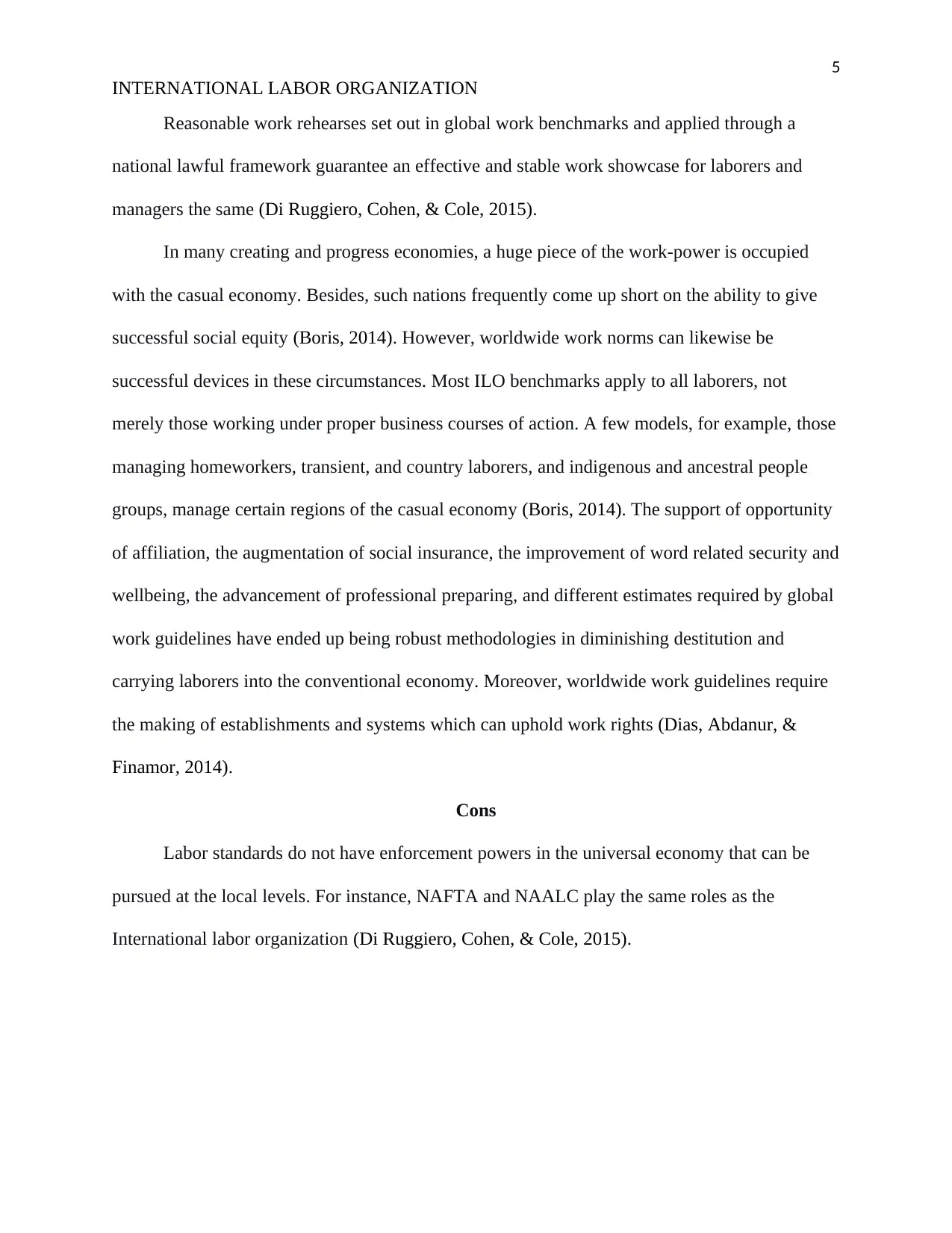
5
INTERNATIONAL LABOR ORGANIZATION
Reasonable work rehearses set out in global work benchmarks and applied through a
national lawful framework guarantee an effective and stable work showcase for laborers and
managers the same (Di Ruggiero, Cohen, & Cole, 2015).
In many creating and progress economies, a huge piece of the work-power is occupied
with the casual economy. Besides, such nations frequently come up short on the ability to give
successful social equity (Boris, 2014). However, worldwide work norms can likewise be
successful devices in these circumstances. Most ILO benchmarks apply to all laborers, not
merely those working under proper business courses of action. A few models, for example, those
managing homeworkers, transient, and country laborers, and indigenous and ancestral people
groups, manage certain regions of the casual economy (Boris, 2014). The support of opportunity
of affiliation, the augmentation of social insurance, the improvement of word related security and
wellbeing, the advancement of professional preparing, and different estimates required by global
work guidelines have ended up being robust methodologies in diminishing destitution and
carrying laborers into the conventional economy. Moreover, worldwide work guidelines require
the making of establishments and systems which can uphold work rights (Dias, Abdanur, &
Finamor, 2014).
Cons
Labor standards do not have enforcement powers in the universal economy that can be
pursued at the local levels. For instance, NAFTA and NAALC play the same roles as the
International labor organization (Di Ruggiero, Cohen, & Cole, 2015).
INTERNATIONAL LABOR ORGANIZATION
Reasonable work rehearses set out in global work benchmarks and applied through a
national lawful framework guarantee an effective and stable work showcase for laborers and
managers the same (Di Ruggiero, Cohen, & Cole, 2015).
In many creating and progress economies, a huge piece of the work-power is occupied
with the casual economy. Besides, such nations frequently come up short on the ability to give
successful social equity (Boris, 2014). However, worldwide work norms can likewise be
successful devices in these circumstances. Most ILO benchmarks apply to all laborers, not
merely those working under proper business courses of action. A few models, for example, those
managing homeworkers, transient, and country laborers, and indigenous and ancestral people
groups, manage certain regions of the casual economy (Boris, 2014). The support of opportunity
of affiliation, the augmentation of social insurance, the improvement of word related security and
wellbeing, the advancement of professional preparing, and different estimates required by global
work guidelines have ended up being robust methodologies in diminishing destitution and
carrying laborers into the conventional economy. Moreover, worldwide work guidelines require
the making of establishments and systems which can uphold work rights (Dias, Abdanur, &
Finamor, 2014).
Cons
Labor standards do not have enforcement powers in the universal economy that can be
pursued at the local levels. For instance, NAFTA and NAALC play the same roles as the
International labor organization (Di Ruggiero, Cohen, & Cole, 2015).
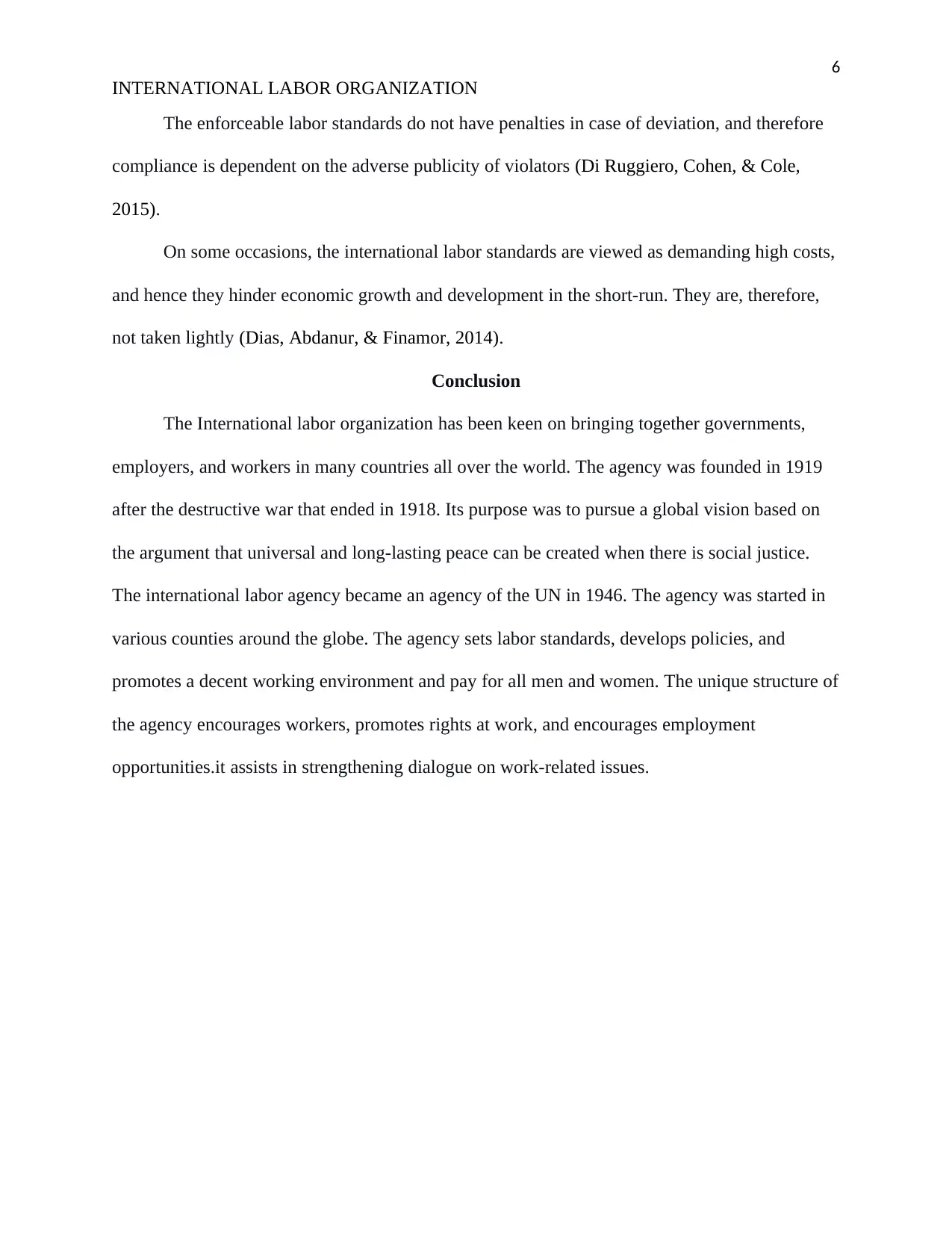
6
INTERNATIONAL LABOR ORGANIZATION
The enforceable labor standards do not have penalties in case of deviation, and therefore
compliance is dependent on the adverse publicity of violators (Di Ruggiero, Cohen, & Cole,
2015).
On some occasions, the international labor standards are viewed as demanding high costs,
and hence they hinder economic growth and development in the short-run. They are, therefore,
not taken lightly (Dias, Abdanur, & Finamor, 2014).
Conclusion
The International labor organization has been keen on bringing together governments,
employers, and workers in many countries all over the world. The agency was founded in 1919
after the destructive war that ended in 1918. Its purpose was to pursue a global vision based on
the argument that universal and long-lasting peace can be created when there is social justice.
The international labor agency became an agency of the UN in 1946. The agency was started in
various counties around the globe. The agency sets labor standards, develops policies, and
promotes a decent working environment and pay for all men and women. The unique structure of
the agency encourages workers, promotes rights at work, and encourages employment
opportunities.it assists in strengthening dialogue on work-related issues.
INTERNATIONAL LABOR ORGANIZATION
The enforceable labor standards do not have penalties in case of deviation, and therefore
compliance is dependent on the adverse publicity of violators (Di Ruggiero, Cohen, & Cole,
2015).
On some occasions, the international labor standards are viewed as demanding high costs,
and hence they hinder economic growth and development in the short-run. They are, therefore,
not taken lightly (Dias, Abdanur, & Finamor, 2014).
Conclusion
The International labor organization has been keen on bringing together governments,
employers, and workers in many countries all over the world. The agency was founded in 1919
after the destructive war that ended in 1918. Its purpose was to pursue a global vision based on
the argument that universal and long-lasting peace can be created when there is social justice.
The international labor agency became an agency of the UN in 1946. The agency was started in
various counties around the globe. The agency sets labor standards, develops policies, and
promotes a decent working environment and pay for all men and women. The unique structure of
the agency encourages workers, promotes rights at work, and encourages employment
opportunities.it assists in strengthening dialogue on work-related issues.
⊘ This is a preview!⊘
Do you want full access?
Subscribe today to unlock all pages.

Trusted by 1+ million students worldwide
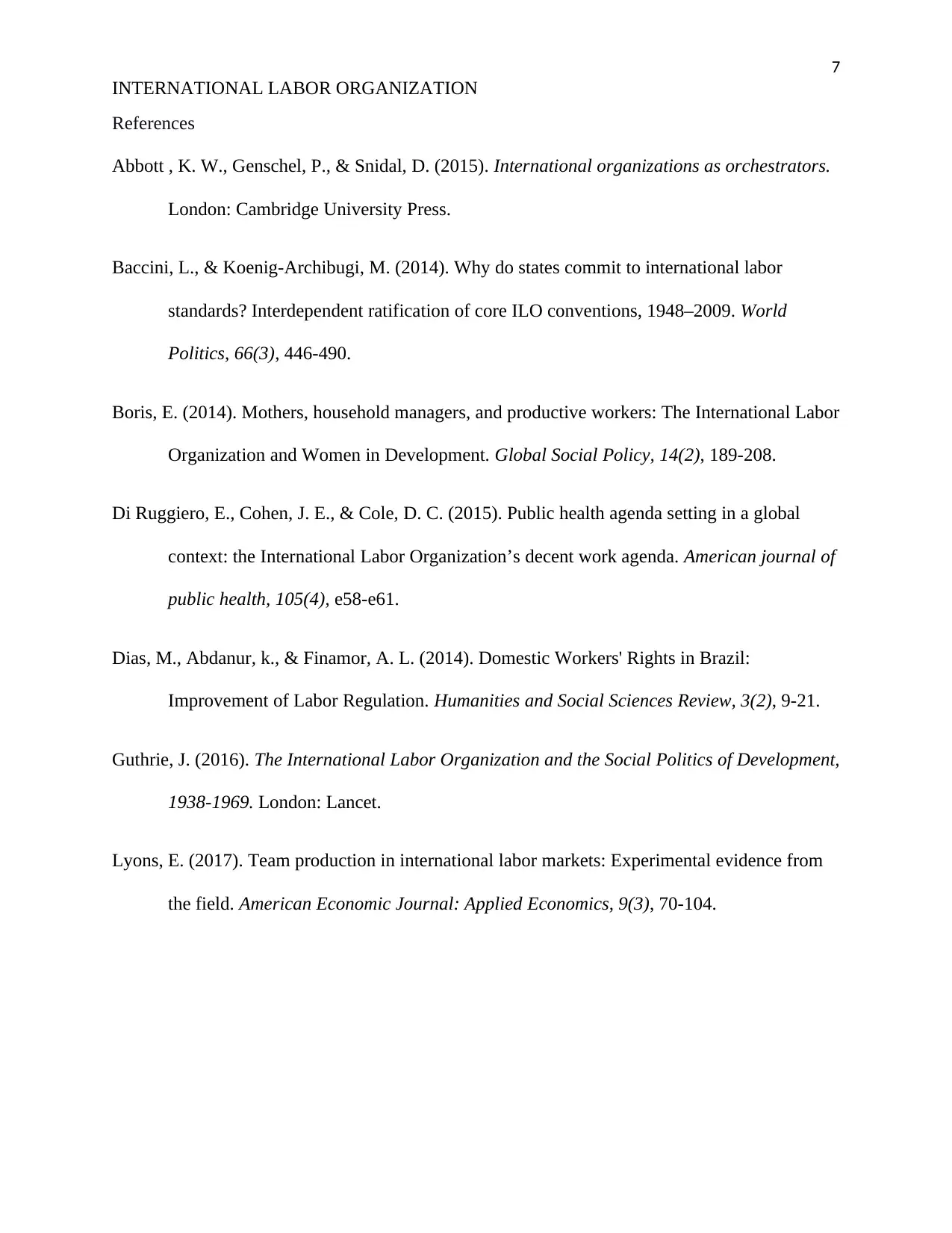
7
INTERNATIONAL LABOR ORGANIZATION
References
Abbott , K. W., Genschel, P., & Snidal, D. (2015). International organizations as orchestrators.
London: Cambridge University Press.
Baccini, L., & Koenig-Archibugi, M. (2014). Why do states commit to international labor
standards? Interdependent ratification of core ILO conventions, 1948–2009. World
Politics, 66(3), 446-490.
Boris, E. (2014). Mothers, household managers, and productive workers: The International Labor
Organization and Women in Development. Global Social Policy, 14(2), 189-208.
Di Ruggiero, E., Cohen, J. E., & Cole, D. C. (2015). Public health agenda setting in a global
context: the International Labor Organization’s decent work agenda. American journal of
public health, 105(4), e58-e61.
Dias, M., Abdanur, k., & Finamor, A. L. (2014). Domestic Workers' Rights in Brazil:
Improvement of Labor Regulation. Humanities and Social Sciences Review, 3(2), 9-21.
Guthrie, J. (2016). The International Labor Organization and the Social Politics of Development,
1938-1969. London: Lancet.
Lyons, E. (2017). Team production in international labor markets: Experimental evidence from
the field. American Economic Journal: Applied Economics, 9(3), 70-104.
INTERNATIONAL LABOR ORGANIZATION
References
Abbott , K. W., Genschel, P., & Snidal, D. (2015). International organizations as orchestrators.
London: Cambridge University Press.
Baccini, L., & Koenig-Archibugi, M. (2014). Why do states commit to international labor
standards? Interdependent ratification of core ILO conventions, 1948–2009. World
Politics, 66(3), 446-490.
Boris, E. (2014). Mothers, household managers, and productive workers: The International Labor
Organization and Women in Development. Global Social Policy, 14(2), 189-208.
Di Ruggiero, E., Cohen, J. E., & Cole, D. C. (2015). Public health agenda setting in a global
context: the International Labor Organization’s decent work agenda. American journal of
public health, 105(4), e58-e61.
Dias, M., Abdanur, k., & Finamor, A. L. (2014). Domestic Workers' Rights in Brazil:
Improvement of Labor Regulation. Humanities and Social Sciences Review, 3(2), 9-21.
Guthrie, J. (2016). The International Labor Organization and the Social Politics of Development,
1938-1969. London: Lancet.
Lyons, E. (2017). Team production in international labor markets: Experimental evidence from
the field. American Economic Journal: Applied Economics, 9(3), 70-104.
1 out of 7
Related Documents
Your All-in-One AI-Powered Toolkit for Academic Success.
+13062052269
info@desklib.com
Available 24*7 on WhatsApp / Email
![[object Object]](/_next/static/media/star-bottom.7253800d.svg)
Unlock your academic potential
Copyright © 2020–2025 A2Z Services. All Rights Reserved. Developed and managed by ZUCOL.





